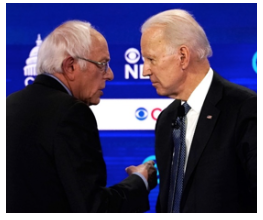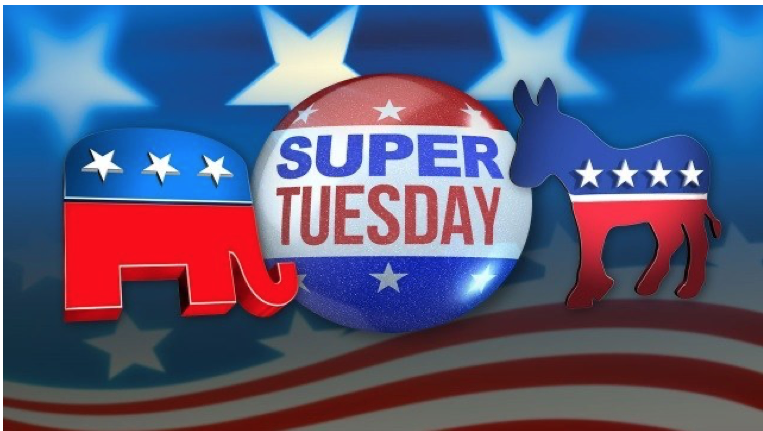CommentsGELFAND’S WORLD--Tuesday night should be the moment to start feeling less depressed about the state of our country.
We will likely have a choice for the nominee to run against Donald Trump, or at least we will have an extremely narrowed-down field of at most three or four candidates. People who get paid to write about these things are already trying to set up a stretch run between Bernie Sanders and Joe Biden. It’s unfortunate that the bigger states – California, Texas, Illinois, New York, and Florida -- had so little say in the narrowing down of the field, which seems to have been the result of a mere two elections in unrepresentative states and a couple of caucuses. I mean, Tuesday night’s results might be different if we had candidates like Inslee, Harris, and Booker still in the running.
The system is imperfect, but Tuesday is our chance to make our choice known, and if enough of us are willing to get on board with the democratically chosen nominee, then we can dump Trump. It’s time to stop feeling depressed and start feeling hopeful that the beginning of the end is upon us.
Still, the way this primary system was designed was terrible.
Let’s do the recriminations right now. For decades, the system which allowed Iowa and New Hampshire to have the first shot at the presidential primaries has been a disgrace and, in several cases, a disaster. Decent candidates like Booker, Inslee, and a nearly nameless guy from Colorado were ignored by the voters of the first two states. To a considerable extent, these candidates did well in the seemingly endless series of debates (those who were allowed to participate) but couldn’t get a toehold in the polls. I wonder how different things would have been had the California primary come first, allowing a widely diverse (and highly qualified) group of candidates to gain delegates right from the outset.
Might early west coast primaries have yielded up Harris, Inslee, and Buttigieg?
It’s bitterly ironic that the day after the Iowa caucus boondoggle, the leaders of the Democratic Party started to talk about replacing Iowa from its first-state status. Really? It only occurred to you now? It’s been a problem since Jimmy Carter gamed the system, and the problem has been pointed out ever since, but NO, they wouldn’t touch that issue with the proverbial ten foot poll. For one thing, New Hampshire voters made clear that they would punish any candidate who dared suggest any changes in the placement that they themselves had stolen from the rest of us. Iowa and New Hampshire became written in stone as the most important states.
Times changed anyway
In interviews with South Carolina voters, it became clear that very few had been affected enough by the Iowa and New Hampshire results to change their votes. One last minute endorsement by a respected leader sealed the deal for Joe Biden. Maybe a lot of voters (particularly minority voters) have learned to discount the results coming from the pure-white early states.
A reasonable explanation for voter enthusiasm out here
I suspect that the knowledge that we will have a chance to vote in a primary while the field is still open, and that this chance is coming soon, has a strong effect on peoples’ behavior. There is a big difference between getting a chance to be a part of the decision and merely ratifying a choice that has already been made. (When the 2016 primary rolled around in June, the nomination was already a done deal.) South Carolina voters took their opportunity and California voters will do likewise.
On March 3, Californians and Texans and Virginians will be part of the choice. There are some 15 states and voting blocs that will get to play, comprising more than a third of the Democratic Party delegates. Super Tuesday is also a diverse group of voters, ranging from the totally rural to the severely urban. Los Angeles County has more potential voters than those who participated in New Hampshire, Iowa, and South Carolina combined. California will finally have a say in the choice of the next President of the United States of America.
By the way, the Zocalo public lecture series had a panel discussion last year suggesting that California will finally have its say this time around. Congratulations to them for making this prediction and for being right.
Did it have to be this disjointed?
 The old joke goes, “Is this any way to run a railroad?” It’s as if somebody back in the 1950s said, “Let’s take two entirely unrepresentative states and talk about them for the two years prior to the first primaries, and force candidates to spend half their time making the rounds of county fairs to talk about hog futures, and having coffee in sleepy diners in one of the smaller states in New England.” Is this any way to run a system of choosing the next president?
The old joke goes, “Is this any way to run a railroad?” It’s as if somebody back in the 1950s said, “Let’s take two entirely unrepresentative states and talk about them for the two years prior to the first primaries, and force candidates to spend half their time making the rounds of county fairs to talk about hog futures, and having coffee in sleepy diners in one of the smaller states in New England.” Is this any way to run a system of choosing the next president?
Every four years, I dust off the old data and point out that New Hampshire Democrats have a strong propensity to vote for somebody from an adjoining state such as Massachusetts (Vermont anybody?).
Every time some other state tried to match or beat New Hampshire to the gate, either New Hampshire moved its primary up a few weeks or the other state got slapped down by the Democratic National Committee. It’s been an ugly system all along, and now it seems to be dying from its own internal contradictions.
So, in order to have some say in the presidential selection process (any say at all!), a bunch of states jumped their own primaries up to the earliest possible open slot. It would have been easier on the candidates to stagger Tuesday’s elections over a period of a few weeks, but the logic of being relegated to the back of the pack unless we did something was convincing.
What the pundits are saying
It’s almost amusing that the professional writers are freaking out over a possible Bernie Sanders nomination. It’s hard to click on a political column without reading that Sanders will lose to Trump and drag all the down-ballot candidates along with him. Does it occur to them that votes for Trump were, often enough, votes against the status quo, and that Bernie offers a similar opportunity to protest? But looking at the Washington Post’s Daily 202 column shows the same ol’ same ol’. Bernie is too radical for normal folks and blah blah blah.
Mike Bloomberg
Let’s start off with the observation that Tom Steyer ads were running on local television over the weekend even after he had withdrawn from the race. I guess it was too late for him to get a refund on all the television ad buys. And then there were ads by Bernie Sanders arguing that we shouldn’t leave government to billionaires. Personally, I don’t think the Sanders argument is all that convincing – maybe there are good billionaire candidates just as there was a terrible billionaire candidate last time – but these are the effects of having a couple of guys in the race who can pay for their own tv blitzes without having to beg for donations.
So we are getting bombarded with Bloomberg ads that explain that he will get it done and that he will do it while remaining respectful to women. When you’ve got Bloomberg’s money, you can write the message and target it to the entire L.A. basin without sweating where the next telephone payment is coming from.
Here’s what I like about Bloomberg (it’s two things):
First: I heard him give the commencement address at my MIT class reunion in June. He spoke convincingly about his commitment to working on climate change, and he put his money where his mouth is, to the tune of 500 million dollars. That was awfully impressive – he got the right answer and he did something about it.
Second: Bloomberg (for whatever reasons) has ignored the Iowa caucuses and the New Hampshire primary. If he were to win the nomination, that would be the ultimate thumb to the nose for these two states, and it’s long since time that this particular thumb be presented.
Of course you can accuse Bloomberg of buying votes through his expensive television ad campaign. It seems to me that that is what every other candidate would like to do – it’s just that Mike has more money.
Elizabeth Warren is counter programming with a clever ad explaining that when you grow up poor, you learn to work. I don’t think it is all that effective against Bernie Sanders, and Mike Bloomberg didn’t grow up rich. I guess the Warren campaign will have to settle for making an argument against Trump, even though that argument has already been very well made amongst Democrats.
So here’s to all the Democratic voters come Tuesday night. Also remember that if you are a No Party voter, you can ask for the Democratic primary ballot and vote. And by the way, isn’t it time that the description Independent be substituted for the No Political Party term they use now? Perhaps the state can explain to the American Independent Party that their name is misleading and they can get a different one without using the word Independent.
Election Mailers
One of my friends explained to me that he has been getting lots of those shiny mailers (just like me) but he immediately puts them into the recycling bin. The Department of Sanitation has thereby contributed to our political culture in a positive way. Down in my neck of the woods, there is an open seat on the L.A. School Board. Some rich guy has been sending out mailers attacking some of the candidates, but without really saying who he is for. It’s like those mailers that either support or attack ballot measures without ever explaining what the measure would do.
Judges
Just like you, I look at the sample ballot and haven’t a clue about who to vote for in the many superior court judge races. Some folks are partial to deputy district attorneys. I’m not sure why we should follow this rule, but what we really need is a list of candidates who are both skillful enough and have the correct temperament to serve on the bench. Here’s a link [https://www.latimes.com/opinion/endorsements/la-ed-superior-court-20180512-story.html] to the L.A. Times endorsements, which at least have the virtue that some group of people investigated the candidates and did their best to weed out the worst ones.
(Bob Gelfand writes on science, culture, and politics for CityWatch. He can be reached at [email protected])
-cw















